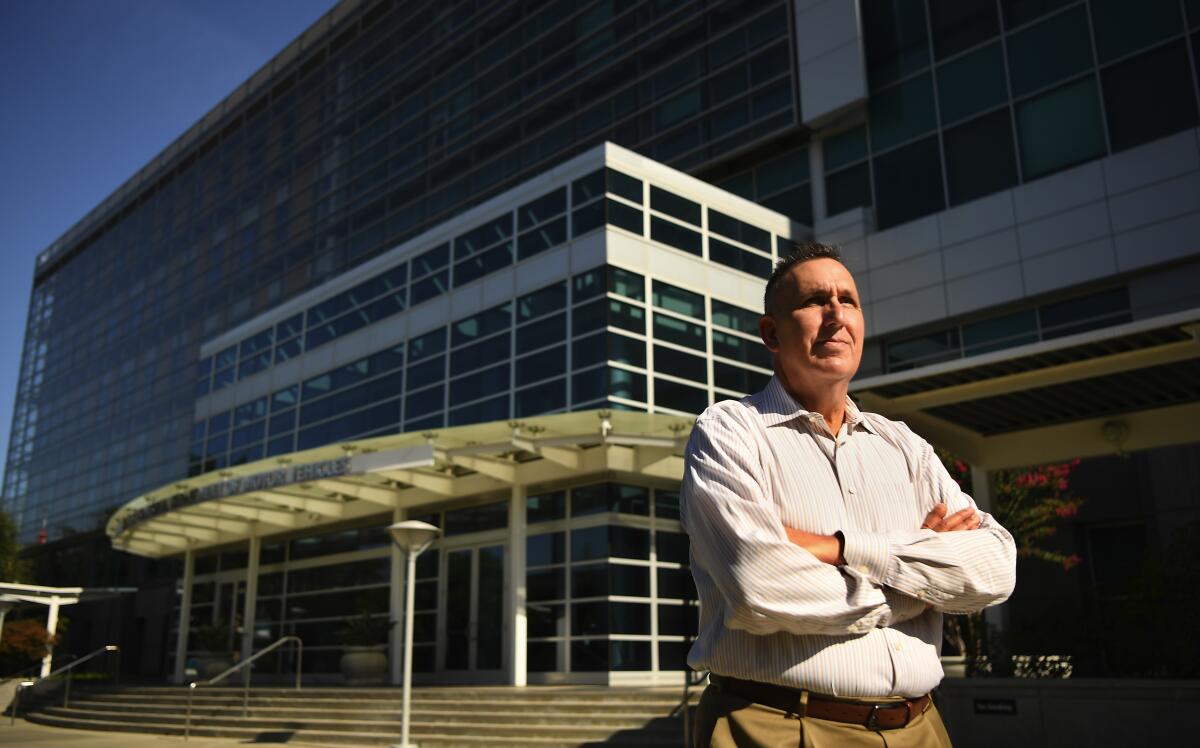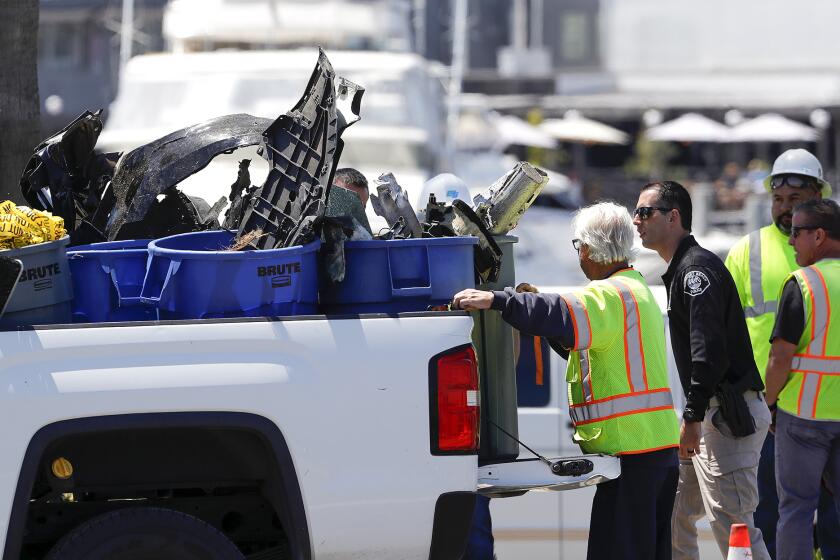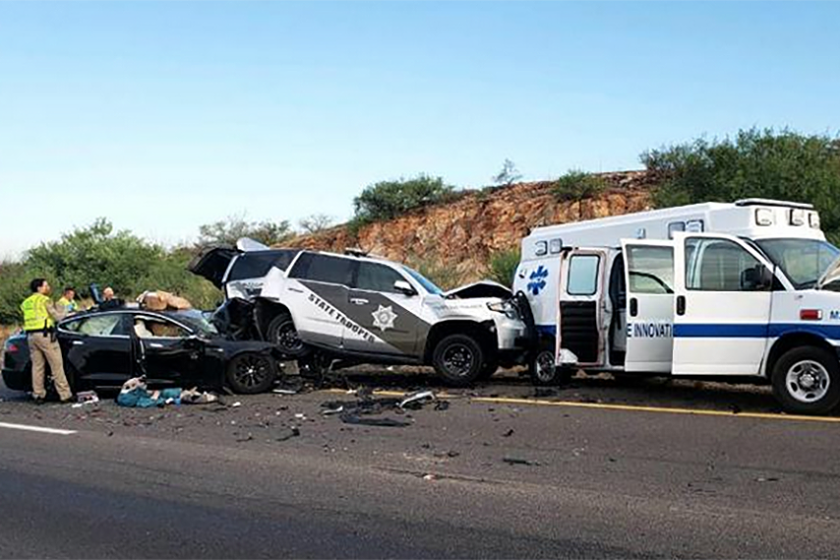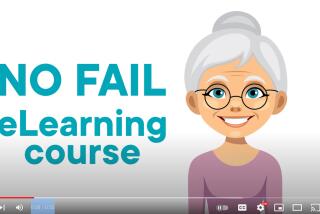The DMV said it would investigate Tesla over self-driving claims. Then, crickets

- Share via
It’s been a year since the California Department of Motor Vehicles opened an investigation into Tesla’s sales pitch for its Full Self-Driving feature, the $12,000 software package that supposedly enables a Tesla car to drive itself through city and neighborhood streets.
It’s been nearly six months since the agency, under pressure from the state Senate Transportation Committee, opened an investigation into safety issues around Full Self-Driving.
What have those investigations turned up?
The DMV won’t say.
When might the results be public?
The DMV won’t say.
Why is it taking so long?
The DMV won’t say.
For Transportation Committee Chair Lena Gonzalez (D-Long Beach), the time for non-answers is past.
“Senator Gonzalez has made the DMV well aware of her dissatisfaction with the lack of movement on this critical public safety issue,” the lawmaker’s media spokesperson said in an email Wednesday to The Times.
The senator asked the DMV for a timeline but “the DMV has made it clear that there is no timeline nor is there a projected completion date for the investigation,” the email said.
Gonzalez is contemplating a legislative hearing on the issue. No hearing is currently planned, her office said, “but this may change as we continue to monitor progress on the investigation.”
The DMV told The Times “The review is ongoing and we will reach out to you when it is complete.”
The internet is filled with videos of the erratic and dangerous behavior of cars running Full Self-Driving. A May 12 Tesla crash in Newport Beach that killed the car’s three occupants and injured several construction workers is being investigated by the National Highway Traffic Safety Administration, in part to see whether Tesla Autopilot or Full Self-Driving were engaged just before or during the crash.
The National Highway Traffic Safety Administration said it had sent a team to investigate the possibility that Tesla’s Autopilot was involved in the crash on Pacific Coast Highway.
One of the DMV investigations looks at whether Tesla is deceptively marketing the robot-car feature by using the term Full Self-Driving Capability on its online order form and other places on its website. State regulations bar automakers from using marketing language to imply a car is capable of autonomous driving when it is not. That investigation was launched in May 2021.
The DMV’s investigation into issues raised by Gonzalez is headed into its sixth month with no end in sight. Gonzalez asked for the DMV’s “assessment of the FSD beta trials,” for information on how the DMV will deal with the situation if it deems Full Self-Driving is unsafe, and whether there is a danger to the public.
For the last year, The Times has sought an interview with DMV head Steve Gordon, a former Silicon Valley executive, but his media relations team has declined each time. Gordon has declined similar requests from other media outlets as well. The Times asked to speak with Gov. Gavin Newsom or his designate about why his administration won’t discuss the matter. The governor’s staff directed the question to the DMV.
Meantime, the crashes continue.
The National Highway Traffic Safety Administration currently is investigating 42 crashes involving robot-controlled automated driving systems. Of those, 35 are Tesla vehicles and seven are from other carmakers.
While regulators investigate a spate of Teslas steering themselves into parked vehicles, Tesla owners have been reporting faulty collision-avoidance systems.
Tesla has been selling Full Self-Driving with a growing list of features since 2016. In recent years it’s been increasing the number of people it allows to use its “beta” version. In Silicon Valley parlance, beta means a program that functions but may contain bugs and isn’t ready for broad public release.
On YouTube, Tesla customers testing the technology on public roads continue to post videos that show it quickly veering into oncoming traffic over double-yellow lines, failing to stop for semi-trucks making turns in front of the vehicles, heading toward metal poles and pedestrians, and much more.
In compliance with DMV regulations, companies such as Waymo, Cruise, Argo, Motional and Zoox have used professionally trained test drivers as a safety backup while testing their own autonomous-driving systems. The companies report all crashes to the DMV and also report what are known as “disengagements,” moments when the robot system fails or otherwise faces a situation that requires human driver intervention.
Tesla’s exemption from those regulations is a matter of definitional parsing by the DMV. The agency, through public documents and prior statements by its media relations department, has said Full Self-Driving is a driver assist system, not an autonomous system.
The feature falls “outside the scope of DMV autonomous vehicle regulations” because it requires a human operator, Gordon told Gonzalez in a five-page letter in January. He noted that DMV regulations apply only to fully autonomous cars but said the agency would “revisit” that stance.
In defending the stance to Gonzalez and others, DMV officials have cited consulting work done on the agency’s behalf by UC Berkeley’s California Partners for Advanced Transportation Technology, or PATH.
But Steven E. Shladover, a research engineer at PATH, said the group’s work with the DMV has been purely technical, focused on automated system capability.
“We’re not legal experts,” he said in a telephone interview. “That was just a research support contract to provide technical advice along the way.”
Tesla has made clear its “design intent” for Full Self-Driving is autonomous driving, Shladover said, and he believes the company’s use of the term “is very damaging to everyone in the [autonomous vehicle] industry, because it will give the entire industry a black eye,” given the unfinished “beta” state of its technology.
Shladover said he’d like to see more oversight on the state and national level — and didn’t pull any punches. “This is NHTSA’s job on the federal level,” he said. “I’d like to see NHTSA stomp on them.”
Automated vehicle law expert Bryant Walker Smith at the University of South Carolina has spoken and written extensively about the vague nature of DMV rules, crafted with language that lends itself to “linguistic loophole” exploitation. “Tesla’s use of ‘FSD’ is, shall we say, very misleading,” he wrote in an article in December for the Stanford Law School Center for Internet and Society.
His article noted that the Society of Automotive Engineers, whose definitions of vehicle autonomy are widely used by regulators, states in official documents that “it is incorrect” to assume that a system is not autonomous because test vehicles require human drivers.
Smith notes that Elon Musk has often often stated publicly that full autonomy for Tesla vehicles is imminent, so Full Self-Driving is being tested as a fully driverless system and thus should fall under the same DMV regulations as all the other companies.
Is the DMV closer to adopting that position than it was five months ago?
The DMV won’t say.
More to Read
Inside the business of entertainment
The Wide Shot brings you news, analysis and insights on everything from streaming wars to production — and what it all means for the future.
You may occasionally receive promotional content from the Los Angeles Times.













